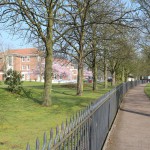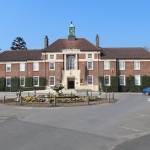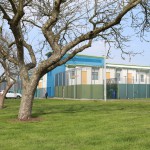Research visit to the “Bethlem Museum of the Mind” & Bethlem Hospital Archive London, April, 2015.
A suburban train takes me to “Eden Park”, not only by name an idyllic village in the south-eastern periphery of London. In the back streets the cherry trees are in full bloom. I cross a creek and walk along the fence of an open space that resembles a huge park until I reach the entrance of Bethlem Royal Hospital. The “Bethlem Museum of the Mind” and its archive are located on the grounds of the psychiatric hospital that is still in operation, after a long history that dates back into the twelfth century. The representative central building of this complex that was inaugurated in 1930 has just recently been opened as the new museum. Here archivist and curator Colin Gale awaits me behind the reception desk. We have a chat about the institution and the museum, especially in late nineteenth century when Francis Galton visited the clinic and commissioned portraits of patients for his photographic experiments with the composite technique.
The portraits of 76 male and 65 female patients are preserved among the “Galton Papers” at the Special Collections of University College London. The frontal, half-length portraits carry a number as well as family names. The archive at Bethlem holds the admission and discharge books as well as the medical files. By comparing the periods of treatment of different patients, who were often also photographed as part of the asylum’s procedure, the photos in the “Galton Papers” can be dated to 1880-1882. Also, not only names, but information on age, profession, family history, as well as the diagnosis notes on the treatment of the mental illness can be drawn from the material. The entries tell veritable stories of the life and fate of the individuals that were used as source material for Galton’s experiments with the composite technique. And while composite portraiture was aimed at de-individualising and typifying, these documents give back an identity and personality to the objects of study. Furthermore the photographs and the material kept at Bethlem Hospital, provide insight into the disciplinary institutions and their policies, modes of categorisation and typification of their clients, often by visual means. Museum of the Mind weiterlesen




